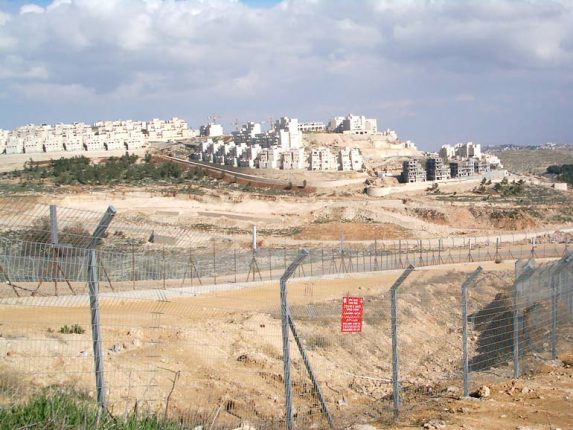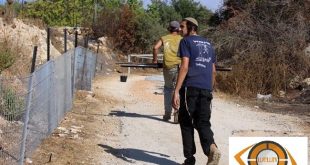By Chaim Levinson
Haaretz
After many postponements, the West Bank outpost of Givat Asaf was about to be demolished in July 2012. The state had promised to demolish the outpost several months prior, following a petition to the High Court of Justice by the left-wing activist group Peace Now. Givat Asaf had been built entirely on Palestinian land.
Eight days before the outpost was to be evacuated, and after the squatters had been living there for more than a decade, settlers pulled a rabbit out of their hat. Officials of Al-Watan, a subsidiary of settlement organization Amana, announced they had purchased a plot of land on the outpost as well as parts of two other plots of land. The state joined the residents of Givat Asaf in requesting a postponement of the evacuation while it clarified whether the change of ownership warranted the outpost’s legalization. Supreme Court President Justice Asher Grunis consented.
There were questions about the legitimacy of the transaction from the start. The chance that a Palestinian landowner would sell a plot of land that was to be discussed in the High Court shortly before its evacuation is close to nil, and forging a land transaction is no rare occurrence in the West Bank. Several months ago, when the Palestinians landowners learned of the supposed purchase, they quickly petitioned the Jerusalem District Court that the registration be changed back, claiming that they had never sold the land to anyone and that the documents were forged.
The affair came to a predictable end this week when the State Prosecutor’s Office notified the Supreme Court, “The opinion submitted by the forensic science department indicates there is a suspicion of forgery regarding the document of sale of one of the three aforesaid plots of land.” Although the state announced it would “consider its measures” in light of the new information, Al-Watan had already won the round: The evacuation was postponed for two years, which may well have been used for additional “transactions.” The outpost will keep on going from one appeal to the next until the arrival of either peace or the third intifada.
Reclaiming the Jewish homeland
Al-Watan (“Homeland” in Arabic) is a company registered in the West Bank according to Jordanian law, which stipulates that only a resident of the area or a company registered there may purchase land. Al-Watan was established in 2002 to buy Palestinian-owned land for Jewish settlement. The owners of Al-Watan are Amana (through its subsidiary Binyanei Bar Amana) and the Mateh Binyamin Regional Council (through the Mateh Binyamin Development Company). The company is managed by Ze’ev Hever, who runs many companies and agencies behind the establishment of outposts in the West Bank. Hever began working for the company in 2011 upon the departure of the previous director, Yitzhak Mamo.
Hever, who was a member of the Jewish underground in the 1980s and served an 11-month jail term for his activities in the group, has been running Amana for the past 25 years. He is considered a prominent figure in Jewish settlement in the West Bank. With his broad connections in the government, the army and the Civil Administration, he is considered a close friend of Housing Minister Uri Ariel and Benzi Lieberman, the director of the Israel Lands Authority and former director of the Yesha Council. The doors of Defense Minister Moshe Ya’alon and Justice Minister Tzipi Livni’s offices are open to him, as are those of the Prime Minister’s Office and the Finance Ministry. In the past, he was close with former Prime Minister Ariel Sharon. About a year ago, Haaretz published an expose revealing the scope of Amana’s illegal construction activities in the West Bank and raised questions about what appeared to be deliberate disregard of Amana’s actions by law-enforcement authorities.
Since the Land Registry Office in the West Bank keeps its records sealed, there is no way to know how much land Amana has purchased. But a look at the building plans submitted to the Civil Administration in recent years shows that Al-Watan’s activity is limited to buying land on outposts that are under threat of demolition — purchases that quickly turn out to be dubious. Criminal proceedings have never been initiated against the company.
Yariv Oppenheimer, the executive director of Peace Now, said, “The State Prosecutor’s Office is overly forgiving, and is not using even one-tenth of the tools at its disposal to prosecute the ones who are responsible and stop this from happening. There are no arrests, no recruitment of state’s witnesses and no questioning under caution about the submission of false and forged affidavits to the Civil Administration and to the court. The Land of Israel is being purchased by fakery, using methods taken from the underworld, and the State Prosecutor’s Office has no one who will investigate and find the ones responsible.”
Hever said, “Al-Watan conducts its business honestly. But it is natural that the sellers of the land on the Arab side would deny the sale and even complain about it to the police, since the Palestinian Authority has enacted a law mandating the death penalty for anyone selling land to Jews. I suggest that those who are in a hurry to draw conclusions wait for the court’s final ruling, and then form their opinion.”
Long-dead sellers
In 2006, Peace Now petitioned the High Court via attorneys Shlomi Zacharia and Michael Sfard, asking for the demolition of Migron, which was then the largest outpost in the West Bank, with approximately 50 families living there. Al-Watan came to Migron’s aid. Its officials told the High Court that the company had purchased two plots of land on the outpost two years earlier. But a probe by the police’s National Fraud Squad quickly showed the purchase was fake. The power of attorney for the sale had been signed in 2004 in California by a man who had died in Ramallah 40 years earlier, and the American notary whose signature was on the document told Israeli investigators that his stamp had been stolen several months earlier.
The findings of the police probe did not keep Al-Watan from holding onto the documents in an effort to prevent the outpost’s demolition. In 2011, on a eve of the Supreme Court hearing that would decide the outpost’s fate, Al-Watan sued in Jerusalem District Court to have the land registered in its name, providing the same forged documents as evidence. In the Supreme Court hearing, they claimed they needed to await the district court’s ruling. In that case, the judges did not respond to the request, and when the Migron case ended in January of this year, Al-Watan withdrew its lawsuit.
With this avenue closed, Al-Watan went to Plan B. In an urgent, secret request to the Supreme Court, its officials cited two new land purchases in Migron. Absurdly, one of them concerned a plot of land that the company had already claimed to have purchased in 2004. The second transaction screamed forgery: The seller was a 100-year-old man who had died at an advanced age six months before the sale was reported to the Civil Administration. The man spent his final years bedridden in his son’s home, out of contact with the outside world. Still, the Civil Administration approved the transaction.
Although the residents of Migron were evicted in 2012, the buildings remained standing until the end of the police investigation of the case. When the probe ended last week and its findings were presented, attorney Aner Helman of the State Prosecutor’s Office notified Al-Watan’s attorney that the document they had offered as proof of the transaction’s validity was fake and that the buildings would be evacuated this week. When Haaretz asked the Justice Ministry whether it had opened a criminal investigation into who had faked the document, a ministry spokeman said, “Regarding the new information, a police investigation was started that found the document to be forged. We can give no details beyond that for understandable reasons.”
The death penalty for selling to Jews
Al-Watan used a similar method in the case of the Ulpana Hill neighborhood of the Beit El settlement, and received cooperation from the State Prosecutor’s Office. In the summer of 2012, five buildings that had been constructed illegally on land privately owned by Palestinians threatened the coalition’s stability. After the state promised to evacuate them, Al-Watan officials claimed that Al-Watan owned the land and provided a purchase contract as proof. The police probe found that the name of the seller was not the name of the owner and that the seller had been seven years old at the time the sale was registered in his name — which is not permitted under Jordanian law.
Not even Amana’s officials believed this fictitious purchase. MK David Rotem, who was then the company’s attorney, added a clause to the purchase contract stipulating that the contract would be completed when the fictitious seller showed proof that he was the owner of the land. This was never done. The scenario was repeated: Several days before a crucial hearing in the High Court, a petition was submitted to the Jerusalem District court asking that the land be registered in Al-Watan’s name. Several days later, the state claimed in the High Court that it needed to wait until the lawsuit was decided to demolish the buildings. But the judges denied the request. After Ulpana was evacuated, Al-Watan withdrew its lawsuit.
Al-Watan officials claim that the company purchased land in Amona as well, 17 years after the outpost was established. Following this claim, the state told the High Court it not longer intended to demolish the outpost. Two lawsuits brought by the original landowners, which claim forgery, are pending in Jerusalem District Court.
In another case, which was not discussed in the High Court, the district court ruled that the documents the company produced in 2003 as evidence of the purchase of a Palestinian home in the village of Deir Dibwan, near Ofra, were not authentic. Members of the Mishpetei Eretz Institute for Halacha and Law took possession of the building on the basis of those documents and are still there despite the court’s ruling.
Land transactions in the West Bank are susceptible to trouble and to forgery. According to Palestinian Authority law, any Palestinian who sells land to Jews is subject to the death penalty (although this law has never been invoked during Mahmoud Abbas’ term as president). For this reason, even real transactions are carried out via a series of straw men. In an off-the-record conversation, a former high-ranking official of Al-Watan claimed that the company was actually a victim rather than a perpetrator: Crooked people were taking advantage of its eagerness to buy land in disputed areas and selling it a pig in a poke. But it seems this claim is disingenuous. Al-Watan has no problem falling victim to stings of this sort, which allow it to present purchased documents to the court. Experience shows that the Civil Administration and the State Prosecutor’s Office tend to cooperate.
A spokesperson for the Coordinator of Government Activities in the Territories commented, “In approving the registration of land transactions in the region, the Civil Administration acts according to the criteria required of it in this matter. If a suspicion arises regarding the credibility of a request, the matter is brought for clarification before the registration is completed. In the case under discussion, the required measures were taken when suspicions arose.”

 العربية
العربية עברית
עברית Türkiye
Türkiye Русский
Русский Français
Français We Watch Israeli Violations Specialized website in monitoring and documenting Israeli violations against Palestinians
We Watch Israeli Violations Specialized website in monitoring and documenting Israeli violations against Palestinians






